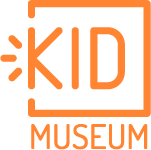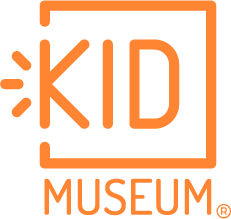
KID Museum’s Maker Educators are highly-trained and extremely busy — they develop innovative new programs and workshops, teach the school groups that come in every day, and design and facilitate camps, after-school programs, and weekend activities. They serve as mentors to our high school apprentices and our high school coding corps, and as inspiration to the thousands of children and families that visit KID Museum each year.
Liza Manfred
1. Where are you from?
Vienna, VA
2. What’s your favorite Open Explore activity?
Lumberyard Construction. I love handing a kid a drill and teaching them how to use it—safely! I find that the younger the kid is, the more seriously they take the responsibility of operating a power tool, and the more they recognize how capable they are. My favorite moment is when a Kindergartener reminds me to put my safety goggles on. I hope my grandfather, who ran a copper and brass mill, would be proud that I was the one to teach them the importance of safety goggles.
3. Do you have a favorite workshop or program you helped develop?
Invention Basecamp. KID Museum is all about teaching kids skills to empower them to make whatever they want. Basecamp is a great example of that—it focuses on the process of making, and demonstrates the importance of practicing your skills. Our county-wide Invent the Future Challenge lets kids apply these skills, and it will culminate in our upcoming Challenge Summit where these skills will be on full display via tangible prototypes.
4. Are there any other programs coming up that you’re excited about?
E-textiles! This summer we are offering a Wearable Gadgets camp where students will bridge textiles and sewing skills with computer programming.
5. What is your preferred method of prototyping, or method for developing programs?
I like to give myself a time limit. When designing for young learners, I want to make sure they can find success at their skill level, but I never want to assume that they aren’t as good at something as I am (except for ripping tape—keep practicing ripping tape, kids). Instead, if I can complete a project in half the amount of time that I am allotting for them, I feel pretty confident that they can do it. But sometimes I’m wrong because kids are awesome, smart, and much better at doing things than a lot of people give them credit for.
6. Why have you chosen maker education as a career?
Again, kids are so smart, and so much more capable than people often give them credit for. Whether those people are parents, teachers, peers, or themselves, I want to make sure each kid can prove them wrong. Maker Education allows us to work towards larger skills and habits of mind: grit, confidence, collaboration, agency, technical skills, and exploration. We call this the “Mind of a Maker,” and these are the skills that allow kids to change the world.
Making also grounds them in a really tangible and accessible project. You’re going to learn by failing, you’ll have to collaborate with the person sitting next to you, and you’ll have to take risks as you explore new tools you’ve never seen before. Over time, these experiences empower kids to know that they can invent the future.
7. Do you have a favorite piece of advice you’ve gotten from a teacher or educator?
“You don’t have to be good at something to love it.”
 8. What’s something you’ve made that you’re most proud of?
8. What’s something you’ve made that you’re most proud of?
I am most proud when I make something small and seemingly unimpressive, but in order to make it, I needed to learn a whole new set of skills. I made a display of our “Mind of a Maker,” and could not have been prouder when I cut out a hexagon of clear acrylic with the word “exploration” etched in it. That hexagon may or may not be on a bookshelf in my apartment.
9. What’s your favorite invention, or something you wish would be invented?
I really want there to be a tool on the computer where I can highlight a section of text and make it all capitals with just one click. Automatic Caps Lock. CAPS LOCK IS SO IMPORTANT.
10. What are some of your favorite things to do outside of KID?
I really like grocery shopping and going home to make dinner. I think it’s the perfect way to decompress, and then you get to eat! Except for when I really DON’T want to make dinner. In which case my favorite thing to do is to order pizza.

